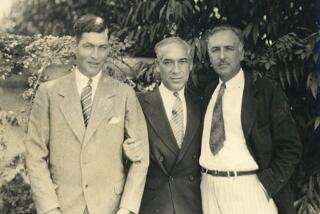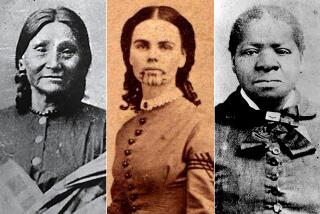Playing Indian for the White Man : THE FENCEPOST CHRONICLES<i> by W.P. Kinsella (Houghton Mifflin: $15.95; 190 pp.) </i>
- Share via
Silas Ermineskin, the narrator in this collection of stories, was hired to write about the Pope’s visit with tribal people in the Northwest Territories. Silas is not pleased when he learns that he and his friend must sleep in a tent with other reporters.
“I mean knowing about the outdoors don’t come naturally to Indians. . . . We like hotel rooms, Kentucky Fried Chicken, video games, riding in taxis, and electric guitars.”
W. P. Kinsella, who was born on a farm near Edmunton, Alberta, has earned wide recognition for his wild imagination and rash humor as a writer. He has published two novels about baseball (“Shoeless Joe” and “The Iowa Baseball Confederacy”) and several collections of stories about Indians, including “The Moccasin Telegraph.”
The author does not claim to be an Indian; however, a tribal view is implied because Silas Ermineskin, the narrator of these “hilarious Indian tales,” speaks to the reader in a first-person voice. The author restrains the narrator and holds back the rich humanness of tribal experience.
“I know they figure if they give all us Indians enough hockey sticks, basketballs and volleyballs, we forget our land claims, quit drinking too much, get good so we can have the weekends off to play games,” said the narrator.
Ermineskin is a fictional narrator, but imagination does not absolve racialism; humor is no excuse to exploit negative preconceptions about tribal people. The author plays Indian for a white audience.
There are 13 stories in “The Fencepost Chronicles” about corrupt tribal leaders, trouble on the reserve, survival schemes, and communal drinking. “No matter what they say it wasn’t us that started the riot at St. Edouard Hockey Arena,” is the first sentence of the book. Three pages later, the narrator explains, “We stop for lunch in a town called Elk Point, actually we stop at the bar . . . most of the team is serious drinkers.” The author continues this “firewater” theme from “The Moccasin Telegraph.” There is too much alcohol in these stories; Indians seem to do the drinking while whites do the thinking. The Indians even weaken Sgt. Cujo, a police dog, with alcohol. “He has developed a real taste for home-brew.”
In a story about a cultural exchange program, the characters are wondering what they would exchange: “I’ll teach them how to drink,” said Frank Fencepost. “That’s part of our culture, ain’t it?”
Fencepost tells about the time Baptiste Wind telephoned the local Alcoholics Anonymous: “ ‘Do you guys take cara drunksh?’ he ask. ‘Why yes, we do,’ say the AA person. ‘Do you want to join?’ ‘No, I want to reshign,’ say Baptiste.”
These stories need more truth. The characters are cornered in racialism and limited in humanness; they act stupid most of the time and speak in a mock patois that is not tribal. Silas said, “Once she got footing she stand with an arm on each goal post, glare fierce from behind that mean mask what painted like a punk rock album cover.”
Ermineskin is a writer, but at times, the author intrudes and renders the voice of the narrator even more unreliable: “She thinks I should write political manifestos, whatever they are, and that I should put a lot more social commentary in my stories.”
The humor seems more honest when a character responds to the narrator and the author: “It ain’t right that you get to prepare your stories in advance, Silas,” said Frank Fencepost. “I have to make mine up right there in the Welfare office.”
The characters are bound by civilization but their trouble seems to be tribal fatalism: “Me and my friend Frank Fencepost have this way of getting into trouble, no matter how hard we try to stay out of it,” said Ermineskin. “I never thought I’d say this, but I think maybe it was a mistake for Frank Fencepost to learn to read and write. Ever since he done that, it open up to him about a hundred more ways to get into trouble.”
More to Read
Sign up for our Book Club newsletter
Get the latest news, events and more from the Los Angeles Times Book Club, and help us get L.A. reading and talking.
You may occasionally receive promotional content from the Los Angeles Times.










